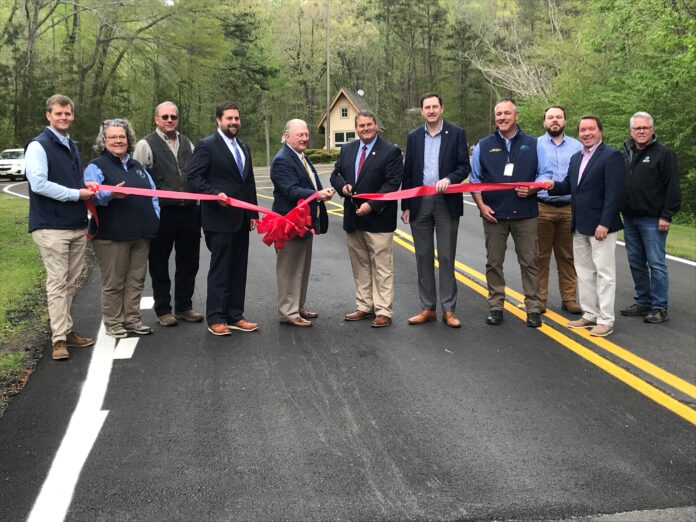GUNTERSVILLE, Ala. – Officials with the Alabama Department of Conservation and Natural Resources (ADCNR) and the Alabama Department of Environmental Management on Tuesday showed off newly resurfaced roads and parking areas at Lake Guntersville State Park paved with asphalt made with materials from items that are routinely discarded—scrap tires.
The repaving at the park using asphalt modified with rubber from ground-up old tires was paid for in part by a $829,080 grant from ADEM to Alabama State Parks. The money comes from the state’s Scrap Tire Fund administered by ADEM. One dollar from the sale of each tire in the state goes into the fund, which is used to remove scrap tires from illegal dumps, along roadsides and other places, as well as promote the recycling of discarded tires.
At a ribbon-cutting ceremony on Monday, April 18, 2022, at Lake Guntersville State Park, ADCNR Commissioner Chris Blankenship said the new pavement is stronger, smoother and will last longer thanks to its rubber composition.
“We were thrilled with the opportunity to resurface the roads and paved areas of the park with a material that will require less maintenance, hold up better in all kinds of weather conditions and greet park-goers with a more pleasant ride,” Commissioner Blankenship said. “We are extremely grateful to ADEM for making this money available.”
The grant covered the costs of repaving access roads and parking areas for the lodge and campground store. State Parks put in an additional $500,000 to pave other roads in the park with the special asphalt.
ADEM Director Lance LeFleur said the paving at State Parks is an ideal demonstration project on how discarded tires can be used for beneficial purposes.
“For many years, old scrap tires have been a nuisance,” LeFleur said. “We have cleaned up tire dumpsites all over the state where tires collect water and become breeding areas for mosquitoes and other pests. Tires strewn along roadsides and waterways are also a common sight. Even when tires are properly disposed of, they oftentimes end up in landfills, which is not ideal either because they take up valuable landfill space and over time can work themselves to the surface.
“The best way to deal with old tires is to find an alternative beneficial use, thereby creating a market for them. If scrap tires had more value, fewer of them would be dumped and become environmental problems.”
LeFleur said that in addition to funding demonstration projects, the Scrap Tire Fund is also used to reimburse local governments for the costs of picking up discarded tires along highways and clearing unauthorized tire dumpsites.
Studies have shown that asphalt made with ground-up tires has many advantages over traditional asphalt. In addition to lasting up to 50 percent longer and being less prone to potholing and cracking, rubber-modified asphalt is quieter, reduces tire wear, improves fuel mileage because of lower rolling resistance and is safer due to better traction and reduced misting on wet roads.
Commissioner Blankenship said the parks system plans to use rubber-modified asphalt to repave roads at DeSoto State Park later this year.
“This complements the work we have done and are continuing to do to improve the campsites, cottages and other amenities to make a visit to a state park even more appealing and enjoyable,” he said. “It’s an investment that pays dividends, now and in the future, because we know the roads and parking areas will hold up better over time.”
About Alabama’s State Parks System
The Alabama State Parks is a division of the Alabama Department of Conservation and Natural Resources and maintains 21 state parks encompassing about 50,000 acres of land and water in Alabama. The parks range from Gulf Coast beaches to the Appalachian Mountains and provide opportunities and facilities from basic day-use activities to resort convention lodging, restaurants and golfing areas. These parks rely on visitor fees and the support of other partners like local communities to fund the majority of their operations.
About the Alabama Department of Environmental Management
The Alabama Department of Environmental Management administers all major federal environmental laws, including the Clean Air, Clean Water and Safe Drinking Water acts and federal solid and hazardous waste laws. The mission at ADEM is to assure for all citizens of the State a safe, healthful, and productive environment.
For more information, visit http://adem.alabama.gov.



















